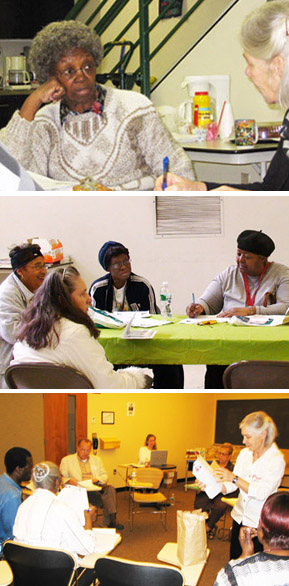In Public Health, Knowledge Is Power
SPH partnership helps public housing residents find resources

As a longtime tenant of the Cathedral Housing Development inBoston’s South End, Ruth Barkleyknows that her fellow public housing residents are more likely to suffer fromill health — including asthma, diabetes, and hypertension — than other cityresidents.
She also knows that many residents land in the health-caresystem ill-equipped, lacking information about issues ranging from choosing adoctor to buying prescription drugs.
Until recently, Barkley, 77, who has lived at Cathedralsince 1965, didn’t think she could do much to empower her neighbors aroundissues of health.
Now she knows differently.
The Cathedral tenants’ association, which Barkley heads, isthe first public housing residents group to receive a health-promotion grantfrom the Partners in Health and Housing Prevention Research Center (PHH-PRC),based at BU’s School of Public Health. Barkley and Joseph Jeans, another tenant leader, spent weeks learning how to write a grant proposal and draftingplans for a series of health-education workshops they wanted to organize forCathedral residents.
Their work paid off: the Cathedral Tenants United Task Forcesecured a $3,000 PHH-PRC grant that it is now using to run workshopson elderly health, family health, addiction, and other topics.
"When we started out with the grant training, I didn’t knowwhat we were getting into. I wasn’t sure we could do it," says Barkley, who is agreat-grandmother. "But by the final session, when we had designed a programthat could be beneficial to all the age groups in our development, it wasreally exciting."
The training program, dubbed Knowledge Is Power, or KIP,was the brainchild of Doris Bunte, a former CEO of the Boston Housing Authority,who chairs the PHH-PRC’s Community Committee for Health Promotion. Bunte wantedto find ways to help public housing residents help themselves by teaching themhow to apply for grants and tap community resources. She worked with Patricia Hynes, an SPH environmental health professor, to design the KIP program.
Initially, groups of tenant leaders from three Bostonhousing developments went through the training program, learning how to analyzeand respond to a grant proposal. Bunte and Hynes designed a wide-rangingcurriculum for the tenant leaders that covered "everything from the ethics ofbeing responsible for a grant to legal issues to budgeting," Hynes says.
Two of the tenant groups completed thetraining program. So far, only the Cathedral group has submitted a proposal for funding; tenantleaders of the other development are still working on their proposal, whichfocuses on the issue of childhood obesity.
Barkley says the four, three-hour training sessions sheattended were challenging, but she is proud that Cathedral made it through theprocess and secured a grant. The tenant task force designed the series ofresident workshops with help from PHH-PRC staff members Tegan Evans, programmanager for training and education, and Eugenia Smith,program coordinator for the Community Committee for Health Promotion.
"We wanted to do something that would be beneficial to allof our residents," Barkley says. "One of the things that bothers me is thatwhenever we have a program in our development, it’s usually just for youngstersor teens or for one particular age group. Too often, you educate the kids, butnot the parents. We wanted to do a program that could go all the way from theelderly right down to the tots."
In October, the Cathedral task force sponsored the firstseries of health workshops, for older adults — sessions on prescription drugs,senior home-care options, household cleaning and home-care products, andcommunity services, such as transportation. A second series of workshops isplanned in March, focusing on family health. Smith, a public housing residentwho formerly was a resident health advocate at Cathedral, has been assistingBarkley’s group in organizing the sessions.
Barkley says she hopes the workshops will help to educateresidents about health issues and community resources so that they "know theiroptions and aren’t afraid to ask questions" of health-care providers. She saysthe program’s larger value is simply in bringing residents together.
"Too often in public housing, you become isolated to somedegree — from each other and from the community outside," she says. "Thisis a way of bringing folks together and trying to build partnerships with thecommunity."
Smith and Hynes say one aim of the training program is toteach tenants’ groups to advocate for community resources on their own. Overthe last decade, federal and state programs aimed at "empowering" publichousing residents have dwindled, leaving groups such as the PHH-PRC to step inand try to fill that gap.
"Once they have a successful program going, the hope isthey’ll be poised to go to other institutions and form partnerships," Hynessays. "That’s the long-term goal." By bringing in speakers from communityorganizations, she says, "the spin-off will be a network of relationships with healthproviders."
The PHH-PRC is one of 33 Prevention Research Centersnationwide funded by the Centers for Disease Control and Prevention. The center is a partnership among the BU Schoolof Public Health, the BostonHousing Authority, the Boston Public Health Commission, and the CommunityCommittee for Health Promotion. The mission of the center is to engage publichousing residents in community-centered research and education programs.
For her part, Barkley is hopeful that other housingdevelopments will follow Cathedral’s lead in developing health-promotionprograms. She says she is proud that the 420-unit development, whichwent through some "very bad years" of crime and violence, has regained a measureof stability in recent years, in a neighborhood that has experienced a steadygentrification.
"We have our own little United Nations in Cathedral —blacks, whites, Asians, Jamaicans, Dominicans — you name it, we’ve got it,"Barkley says. "The more ways we can find to bring everyone together, the betterfor all of us."
Comments & Discussion
Boston University moderates comments to facilitate an informed, substantive, civil conversation. Abusive, profane, self-promotional, misleading, incoherent or off-topic comments will be rejected. Moderators are staffed during regular business hours (EST) and can only accept comments written in English. Statistics or facts must include a citation or a link to the citation.